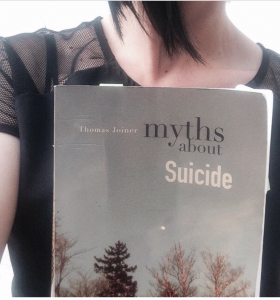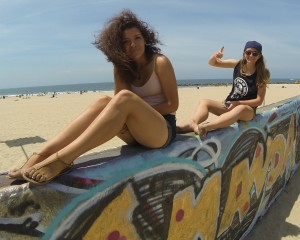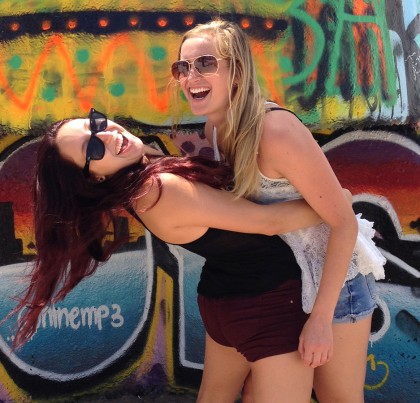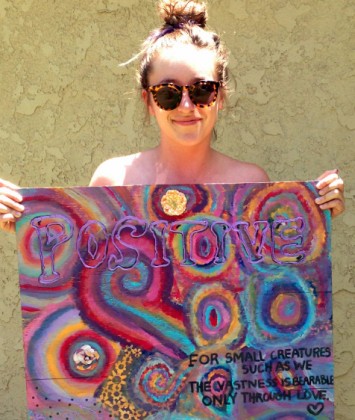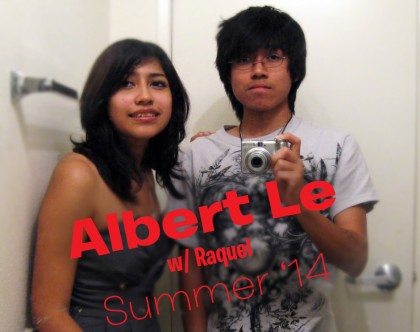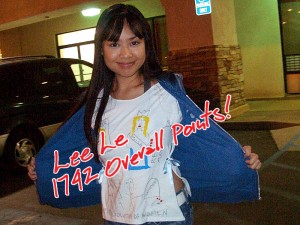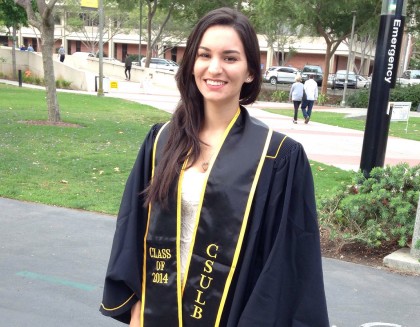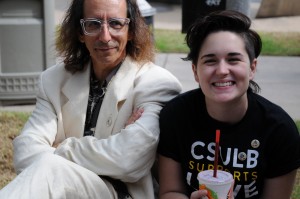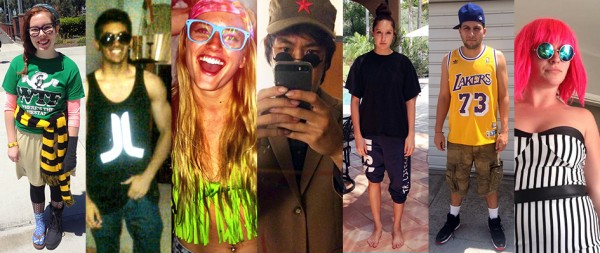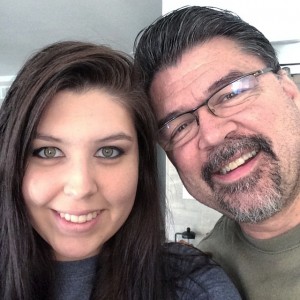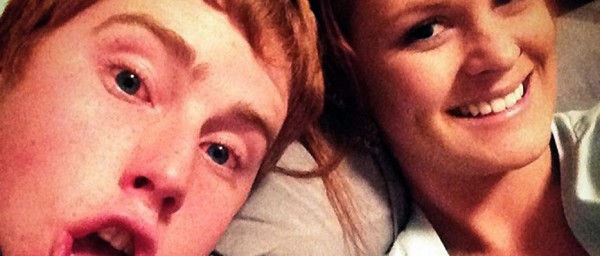I said she didn’t owe me anything, except to make a powerful site. She wanted to at least give me a bottle of fine wine. I said a muffin would suffice. I think Merry didn’t want to be only a taker, but to also give something for the help. In that sense I probably should have let her give me something.
Free with Purchase
The thing is, Merry’s a student at CSULB, and I’m faculty. Which means that just like any of the other 2,148 faculty members here, I’m happy to help any student. Sometimes students can get so buried in coursework and other university hoops, that they forget that the university is like a gigantic, physical Wikipedia. It doesn’t matter if you’re enrolled in someone’s class or not, you can always drop by a faculty member’s office hours and ask them questions.
As a working class university we have students balancing all kinds of responsibilities and work loads. Still, if a student jets on and off campus barely stopping long enough to attend class, they’re really only getting half of the experience and value they’re paying for. Even with 7.275 billion humans alive today, history still holds 15 dead humans for every living. And every one of those 101 billion ancestors, and most of the 7.275 alive today, have never had the privilege of a resource like CSULB and its wildly diverse 2,149 faculty members. I’m happy that Merry took advantage of a little of what CSULB has to offer today. And I can’t encourage other students enough: sieze the opportunities that your time at the university offers! Why pay tuition and then sit in the last row? 59 years ago Rosa Parks redefined freedom in America by demanding her right to a seat in the bus. Why don’t CSULB students demand a seat in the (often empty) front row of the classroom?
It’s about Community
Merry truly owes me nothing. But if I have a wish for her and other CSULB students, it’s to use the extraordinary tools of our time to create compelling communities. Facebook and many other online platforms where we are the product, not the customer (aka meat packing factories) have an undeniable stickiness and allure to them. They’re quite literally designed to trigger dopamine releases.
Older sites like Facebook have converted from “pages” to “streams,” and newer platforms like Instagram (owned by Facebook) were born as streams. There’s no doubt that streams are efficient ways to surf a lot of content. Got a 10-minute break from your barista job? With a few finger swipes of your iPhone 6 Plus you can scroll past hours of your friends lives with enough time left over to even like a few of them.
Streams are a nice way to quickly update yourself on a thousand little things. The are new communities and have interesting power that I don’t want to be too quick to ignore. But I still love Pages.
The Blogosphere Lives?
Pages, and The Blogosphere, sort of died, perhaps in part because tycoons like Mark Zuckerberg steamrolled over them on the way to paving his industrial parking lot, but also because we’ve been flailing wildly trying to deal with the problem of abundance. Compared to the problem that those earlier 101 billion humans had, and that so many of the 7.275 alive today still have: scarcity, abundance is a good problem to have. But just because it’s better than scarcity, doesn’t mean that abundance isn’t a real and serious problem.
Your Facebook stream lets you have it all. One bite of every single dish at the endless buffet. But is it a meal?
People like David Weinberger, Thomas Vander Wal, Marco Arment, Gina Trapani, Jason Snell, and Andy Baio have been calling for a sort of Blogosphere revival often focusing on fast and modest length posts.
I’d love to see Merry find other students and faculty here at CSULB, at the grad school she’ll be soon heading off to, and out in the rest of the real world, that she can create her own corner of The Blogosphere with. People who read each other’s posts. People who leave comments. People who write reply posts. (tangential as it may be, this is more-or-less a reply post to Merry’s 1st post)
If Merry can start creating that sort of community, it’d be a far bigger thank you than even the nicest bottle of wine. If she can use these tools to build a community, she’ll have done something extraordinary.
And BTW, my favorite tool for reading blogs is Feedly.
]]>From your votes, here’s a table of feedback on our 12 Activities this summer. I’ve listed them in the order we did them, and then given the number of UpVotes, the number of DownVotes, and then the “Total” (+ – -)
• View directly in Google Docs
Love & Hate
As you can see, one person’s most favorite activity was another person’s least favorite activity. Even the most most favorite activity still got 5 downvotes. Even the least least favorite activity still got 2 upvotes.
Putting all your votes together (upvotes minus downvotes) the class’ overalls are:
Favorites
+6: Painting
+5: Instagram
+4: Plaster Casting
+4: vlogging
+4: Your Turn
Least Favorites
-7: Kickstarter
-5: Rapid Prototype
-3: CFID
And unfortunately, as my scheduling genius would have it, your 3 least favorites were 3 weeks in a row!
The Kickstarter Conundrum
If your votes are to have any real meaning, I kind of have to do something with them. So yes, Painting & Instagram will definitely be back – that part’s easy!
The not-so-easy part is that something should also be out. And that bright red -7 is pointing straight at Kickstarter.
I think one of the many reasons you guys didn’t like the Kickstarter project is that it felt fake. You felt like late-nite TV hawkers selling something bogus. I’m not sure why it came out that way, but that was far from my intention.
I thought the Rapid Prototype project would be cool because it’d be a chance to play with something more related to your major or other interests. Instead of go do painting or photography, it could be think up some simple but useful thing related to Aerospace Engineering or Fashion Merchandising.
Freedom & Democracy
And following RP, I thought Kickstarter would be a nice chance to both think about Arts Funding in the 21st century and also your personal opportunities for funding any sort of creative project.
Money & Power
If you think about art through human history, it’s sort of always been guided by the hand of money and power. In the 16th century it was the Medici family. Here in the 21st century it’s Americans like Eli Broad & Europeans like Charles Saatchi. What they find interesting and valuable comes to be interesting and valuable to our culture. What they choose to overlook often comes to be overlooked by our culture.
Charles Saatchi happens to like spending huge sums of money on sharks in formaldehyde tanks. He’s not so interested in riding a real bicycle through a virtual city. Because of those tastes on the part of people like Saatchi, Damien Hirst is today a global brand, while Jeffrey Shaw‘s name is found only in “Computer Art” books. There’s a whole alternate late-20th-century Art History that wasn’t really written because of the tastes of money and power.
The Politics of Art
Another way we fund art is through nations and budgets for things like the American National Endowment for the Arts (NEA) The politics and nuances of who and what does and doesn’t get funded by the NEA, and whether America even wants to have an NEA at all, are complex, nuanced, long running, and unfortunately, highly politicized. I shouldn’t even start on all that here, but suffice to say, when politicians and political appointees are choosing what art gets funded, it can get pretty messy.
Another Way of Funding Art
Which brings us back to Kickstarter and why your very least favorite activity of all feels so important to me. With a platform like Kickstarter you don’t need elite access to money and power, you just need to build a small network of people who care about your ideas.
Kickstarter projects are funded by family, friends, people who read your blog, people on your mailing list, and Kickstarter website surfers.
With drones so crazy hot ATM, an Aerospace Engineer like Ricki could put together a pitch for a cool new low-cost drone project. Or if you think about our Singer & Dancer: Juston & Justin: Juston could pitch for funds to produce a new record, Justin for a new performance. And not just “art,” but anything creative. We have a number of Engineers in the class who could pitch all sorts of things that might be interesting.
The Philosophy Duo we looked at raised $500 to produce their songs. Kristen Bell & Rob Thomas raised $5,000,000 to make their movie. You guys could easily imagine small things and make them real. It’d be a little weird to call up your aunt or uncle and say, hi, I want to make some paintings, can you give me a hundred bucks? But if you sent them off to a nice, shiny site like Kickstarter where they can see how serious, passionate, and professional you are, I think they’d be thrilled to invest $100 in this cool project by their favorite nephew or niece.
Do Votes Matter?
So I’m kind of stuck. I truly do want your votes to mean something. Which suggests that Kickstarter should be out. (or substantively modified) But I also think it’s so important both as an understanding of the way we as a people fund Arts, and also as a real possibility to fund your own creative ideas, be they small, medium, or large.
Prototype What?
Your 2nd least favorite activity was Rapid Prototype. This also surprised me since I thought it’d be a chance to do something related to your major or other personal passion. I actually like the RP project a lot. I’ll spare you the passionate plea why I like it for now, and just say that while I do like it, it’d be a less bitter pill for me to let this one go.
ePortfolio
Meanwhile, while I’ve been talking a lot about having your websites be ePortfolios and not only “turn-in-my-homework” sites, I haven’t really given you the opportunity to make that happen. I just talk a lot and hope you’ll do it on your own.
One thought is to let go of the RP Activity and replace it with a “Real ePortfolio” activity where you focus on making your website about your Journalism or Nursing or Marine Biology or other professional pursuit. Or about Cars or Cosplay or other personal passion.
We could rename the Wk 1 Activity that’s currently called “ePortfolio” to “Web Design.” That’s more accurate anyway, since Wk 1 is really more like make an account and get yourself on the web nowwww! And then have (real) ePortfolio be about making a site that truly presents what you’re achieved. For a senior looking to enter the world that might be a bit different that for a freshman looking to have fun in college, but for both it could be a place to document your achievements for presentation to the HR Directors of the world, be that next month or in 4 years.
Tell Me Again?
Strictly by the numbers, Kickstarter should go. Or Kickstarter and Rapid Prototype. I’d love to hear if my argument above does or doesn’t carry any weight with you. What do you think about keeping Kickstarter (as is or as a redesigned Activity) and instead letting go of Rapid Prototype and replacing it with You-specific ePortfolio Design?
You’re welcome to leave a comment below if you’d like to share your thoughts.
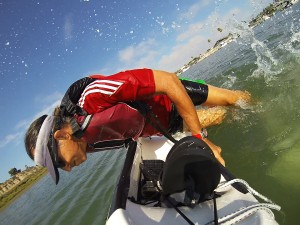
The students aren’t the only ones who benefit from asynchronous learning: Practicing my *cough* flawless surfski remounting technique over summer.
Here’s a video I sometimes play in the F2F class. The singer has so much charisma & power it’s hard to believe that he’s been dead for just a little longer than almost everyone in Art110 has been alive. Time really does fly.
Number One
So many of you did such wonderful work in so many different ways this summer that I almost hate to say who happened to ring up the most points. Jessica, to name just one of you, almost certainly wins the prize for the most creative reinterpretation of the weekly activity briefs. In an art class or really, at a university, Jessica’s kind of creativity should be celebrated. I think it’s why we’re here. Not just to be “creative” in The Arts, but to be “creative” in Business, Engineering, and whatever your life passion is.
Maybe you’re the accountant who creatively rearranges a spreadsheet to reveal something important about your business that no one else has ever realized. Maybe you’re the programmer who doesn’t know that everyone knows that what you’re trying to do can’t be done. So your creative ignorance leads to innovation in programming. Honestly, if the university isn’t about creativity, I don’t know why it’s here.
Nonetheless, I have to confess, that when you have the task of handing out points to a big group of students as fairly and equally as you can, you get just a little bit nervous about how many points is fair for Jessica’s paradigmatic creativity. In the long run, I’m certain that Jessica, and all of you, will be well-served by being true to your deepest self.
Just Tell Us!
Competition and rankings can certainly be critiqued. Still, without stopwatches & scoreboards, we’d never know just how extraordinary the achievements of people like Serena Williams or Michael Phelps are. And if you want to talk about points in Summer Art110, I have just two words for you: Albert Le.
As you know, we had 1,008 points possible this summer, with 900 needed for an “A”. Albert finished Art110 with 1,128 points for a “perfect” 112%! Here he is in the Art110 Hall of Fame!
Besides Albert’s name sparkling there, 4 other interesting things you’ll find there are his connections. Albert’s brought one home for the poor, failing male gender! He’s the first male to take the top spot since Patrick Ho & Tatsuya Ando back in Fall 2011. Yes, the women have been that dominant!
He’s also the 2nd “Le” in the HOF, joining Lee Le back in Fall 2007. Lee went on to graduate (double major) and today she does television reporting for a Vietnamese station here in Los Angeles. Albert’s the 2nd person from the Management major in the HOF, joining Nikki Bark from Spring ’06. And finally, in addition to saving his gender, Albert also pulled one out for those poor, lame duck seniors. Art110 has had 19 Freshmen as #1, 7 sophomores & 4 juniors, but before Albert, Paul Morales from Spring ’06 was the only other senior.
The Le clan, Seniors, Management Majors, and the Male Gender all owe you one Albert!
But Wait, There’s More!
Albert’s work this summer was, honestly, extraordinary. Week after week, he brought depth, seriousness, and even fun to his work. But he wasn’t alone. 3 other of you joined the “Better-than-perfect” club: Jenn: 1081, Sadie: 1069 & Heather: 1028.
Here’s the Top 10 list for Summer ’14:
• direct link to the Google Doc
Other Feedback
Besides your valuable Upvotes & Downvotes for our 12 Activities, you also answered the question, What was the Best & Worst of Art110 for you?
Almost the only thing you listed under “worst,” and listed by almost every single one of you, was the Online Discussion Groups. Fortunately, we already fixed that last week! 
The #1 thing you liked was the Activities as a whole. You also liked Blogging, having a Website No Book, Artist OTW, Art Talks, and taking a class where you could travel anywhere and have the class comes to you.
Me.com
Only one of you actually thought the $18 was a waste of your money. Almost all of you were happy to have a website and your own URL, even if your intentions for future use varied a lot. Many of you said that you were happy to spend $18 for a domain name and not buy a textbook. You guys definitely liked not buying a textbook!
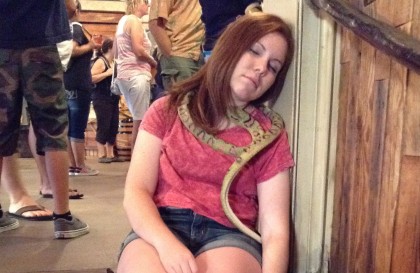
“Landscapes with a Corpse” wasn’t everyone’s favorite activity, but Sadie liked it so much she decided to teach it as her A12 “Teach One.” While she was at it she created another photograph. The 1st time around she was brutally slashed by a home invader. This time she was somewhat more gently bitten by a snake. Like Cleopatra, lying in perfect, eternal repose.
Happy Trails!
And now it’s time to say goodbye. I’ll be hanging out in the School of Art, Art Gallery Courtyard every Thursday this year from 11 – 12:15. If you’re on campus, please feel free to drop by anytime and say Hi! Of course you know my URL & email. But given the busyness of life, for most of you, this really is goodbye.
It’s been a privilege, a pleasure, and an honor to spend a small piece of your college experience with you and to see what you all can do. To see the power of someone like Albert, the creativity of someone like Jessica, the generous community building of someone like Jenn, the innovation of someone like Sadie. (I’ll resist the temptation to go on about every single one of you!
I’ve never had so many seniors in this class before! It’s so awesome to see someone like Julia graduate and already have a great job to start her career with. And yes, freshmen, sophomores, juniors, and super-seniors too, who get to come back and explore college for a while longer.
I hope you find a way to keep art & creativity in your life. I hope we’ve thought about a few possibilities for the 21st century this summer.
We got to go to the beach a couple of times – not just The Beach with buildings, but the beach with sand and water – which I thought was pretty cool, but I’ve since learned that a number of you actually hate the beach!
We shall not cease from exploration
And the end of all our exploring
Will be to arrive where we started
And know the place for the first time.— T. S. Eliot, Little Gidding
I hope your journey in Art110 this summer has helped you know your place a little better. Thanks for sharing it with me.
For those of you returning: have a great time in college. For those of you graduating: have a great career. And for all you: have a great life!
Go Beach!
— Glenn
]]>WhatsApp!
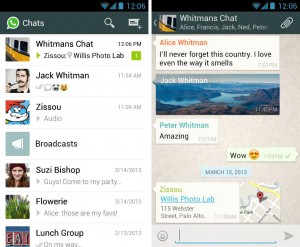 This surprised me. I thought video chat would be more engaging and fun. And I know how hugely successful Google Video Hangouts are in the professional world. I think what I may have failed to realize is that a Video Chat is a lot like a Voice Call, and student-aged peeps have, I think, overwhelmingly chosen text apps like WhatsApp over voice. Just as email used to be “what you use to talk to old people,” a role that Facebook seems to have now, I think voice might be what you use to talk to parents, but WhatsApp is probably a more fun way to engage with friends.
This surprised me. I thought video chat would be more engaging and fun. And I know how hugely successful Google Video Hangouts are in the professional world. I think what I may have failed to realize is that a Video Chat is a lot like a Voice Call, and student-aged peeps have, I think, overwhelmingly chosen text apps like WhatsApp over voice. Just as email used to be “what you use to talk to old people,” a role that Facebook seems to have now, I think voice might be what you use to talk to parents, but WhatsApp is probably a more fun way to engage with friends.
SIDENOTE:
It’s interesting that the already aging Facebook is trying to stay relevant by buying both Instagram and WhatsApp and trying to buy Snapchat. (Facebook bought Instagram in Apr ’12 for US$1B, WhatsApp in Feb ’14 for US$19B, and unsuccessfully offered US$3B for Snapchat in Nov ’13)
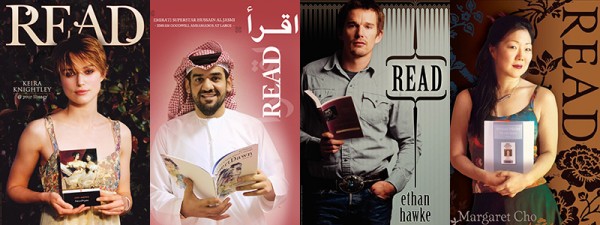
Read
Whenever you visit a library you see one of those well-intentioned Read posters featuring some cool celebrity. I do think reading is important and valuable and the decline of reading probably isn’t good. But it’s also important to remember that back in the days of yore, reading didn’t have a lot of competition. Today reading not only has competition from films and myriad other media forms, but it also has competition from, well, reading! When you see a poster in a library that says “Read” it might be suggesting to read a book. But if you count all the messaging, blogs, and other online media that peeps read, that probably adds up to plenty of novels worth of pages in a year. We can debate whether the nature of short chunks of reading offers the same intellectual and analytic value that diving into the mind of a novel does.
Maybe a novel is a much richer experience for a human being.
Or maybe the interactivity and discussion of text, chat, blogs, and other media offers a rich space of community, interaction, and a place to test perceptions and ideas.
Infinite Choice
 We probably should read more novels. It is an extraordinary form that at its best offers unique and powerful insights. But we should also appreciate that reading has a lot of competition today. Similarly, in the past, and in rural places, things could get boring. But in a place like Los Angeles in the 21st-media-century, boredom almost isn’t an option. One student commented that Foucault wouldn’t get tenure today! And I wonder how many students are ready or interested in embracing the subtlety of a John Cage or Allan Kaprow perspective when they have so many options and so much stimulation available in IRL Los Angeles plus the infinite vastness of YouTube and all the other online spaces.
We probably should read more novels. It is an extraordinary form that at its best offers unique and powerful insights. But we should also appreciate that reading has a lot of competition today. Similarly, in the past, and in rural places, things could get boring. But in a place like Los Angeles in the 21st-media-century, boredom almost isn’t an option. One student commented that Foucault wouldn’t get tenure today! And I wonder how many students are ready or interested in embracing the subtlety of a John Cage or Allan Kaprow perspective when they have so many options and so much stimulation available in IRL Los Angeles plus the infinite vastness of YouTube and all the other online spaces.
Today’s academic model is about 200 years old. Affluent kids moved from boarding school to university. There wasn’t much else to do besides studying and pranks. I think college is still a place where new ideas and great friendship are formed. Does a class need to be part of that? Maybe. But the sorority, the anime club, the volleyball team, the debate team, and so many other options on and off campus also enrich the student experience.
Flexibility
Also dragging the discussions down is the idea that an online class is supposed to be at the learner’s convenience. So text chat: maybe. Video chat: way too much scheduling hassle.
Conclusions
Weekly video chat is out. There could be a possibility of having a week or 2 of special meetups so students could actually meet each other. Text chat is a possiblilty. But as one student noted, since they’re doing weekly creative activities and blogging the results, why not have them look at and comment on each other’s work.
I think that’s the best answer for next summer. Instead of discussion groups move to commenting on each other’s blogs. In the academic year F2F class with 150 students it’s easy to be lost. But in a summer class with 25, commenting on each other’s blog posts could be a way to develop better insight into what others are thinking and doing. And it preserves the asynchronous nature of online classes & text chat that students value.
]]>To view on Mobile: Instagram > #art110sum14
To view on Web: iconosquare.com/viewer.php#/tag/art110sum14
To view on Mobile: Instagram > #art110s14
To view on Web: iconosquare.com/viewer.php#/tag/art110s14
In this slide from Chris Mattia’s keynote talk he asks if we should still grade papers with a red pen, or typed comments that are much more legible but time consuming, or use voice annotation technology to mark as we read. I absolutely believe in the importance of compelling writing, and as a reader for our Writing Proficiency Exam I know that out students are not all excellent, still, as a reader I have some small idea of the number of hours academics across the land spend reading and marking up assigned writing. It’s a staggering number of hours.
Out in the blogosphere peeps write what’s compelling to them, and others do or don’t respond to it. I wonder if networked interaction space might not be a more efficient and engaging space to develop writing skills. You’ll never get the precise grammar and punctuation corrections an English professor can give you, but presumably Shakespeare, Hemingway, and various others somehow developed adequate skills without the benefit of a mentor’s red pen. Is there a space where we free students of “assigned” writing and faculty of endless reading, and instead empower learners to cast their words out to the world and hone their skills through a combination of reading and the less technical feedback of other interested peeps?
Online, MOOCs & Isolation
In his talk Online 2.0: The Future of Online Learning, Peter Campbell from Blackboard gave us his view of the good and bad news for The University vis-a-vis MOOCs.
THE BAD NEWS: If your University courses aren’t at least as compelling as a free MOOC, you’re really in trouble!
THE GOOD NEWS: Campbell doesn’t believe that MOOCs can get to “2.0.” He sees their massiveness as a limiting factor for engagement and that many of the weaknesses of MOOCs are real strengths of The University.
I’m sure he’s part right. In my own MOOC student experience it’s true that I didn’t have email correspondence with the instructor. But I did “see” him twice a week in face-to-face videos where he not only lectured but also commented on student input on the course forums and wiki. And on those forums and that wiki there was as much peer interaction as you wanted. I was impressed by how active the forums were and how quickly posts got voted up or refined.
Another interesting idea Campbell expressed was the feeling of Isolation that online courses can produce. I’m thinking a lot about these issues as I prepare to teach my first 100% online course this summer. I do believe that short lecture videos, viewed at the time and place of the student’s choosing, may well be more engaging than sleeping in my giant 378-seat F2F lecture hall. Campbell suggested that while students appreciate the asynchronous options for viewing, testing, and projects, that
For a significant number of students the asynchronous experience is not enough.
I was planning to make the course 100% asynchronous, as I didn’t want anyone to feel that if they missed even an optional chat that they were somehow getting less out of the experience. Perhaps I can slice Office Hours up to a range of days / times and try Google Hangouts with students. For whoever wants it that’d certainly offer synchronous, live video interaction with myself and their peers. I think Google Hangouts can accomodate 10 video streams, and more users not on video. 10 should be plenty for us! 
Collaborative Learning
I’ve been listening to podcasts from The Berkman Center for Internet and Society for years now. I owe Charlie Nesson a debt I’ll never be able to repay in a single lifetime. Just as some people have spent so many hours with Jennifer Aniston and Matthew Perry in their living rooms that they start to feel they know them, so I have spent so many hours driving in my car with Johathan Zittrain and Lawrence Lessig I almost start to feel I know them.
Education in our century is one of many ideas explored at Berkman. From there and other sources I’ve realized that the era of The Sage on the Stage, if that mode of learning was ever really efficient, is now flowing down to its nadir. But I’ve also found that, at least in a large freshman lecture course, when you lecture less, the students do miss out on so much context, and their project work regresses toward the predictable and the banal.
So I was exited to visit CSULB’s AS-244, the Collaborative Learning Classroom and hear Leslie Kennedy’s talk on this one “experimental” room on campus. The most persuasive information Kennedy offered was not how engaging or immersive or interactive the room was, but that it wouldn’t be the one room for long:
• September 2013: 4 Collaborative Classrooms at CSULB
• September 2014: 34 Collaborative Classrooms at CSULB
If that isn’t the handwriting on the dry-erase wall, well… And indeed the room is engaging. I spent a semester teaching in Fullerton’s All the Arts for All the Kids program, visiting many 1st through 6th grade classrooms, and the organization of this space reminded me of nothing so much as a 2nd grade classroom in Fullerton. Of course education has never been an all-lecture affair, The Arts have always featured “Studio” classes, and The Sciences have always featured “Lab” classes. And even if an English class is in a traditional classroom, those old wooden desks are very quickly turned to form “collaborative” reading and discussion groups.
On another level, I sometimes wonder why we focus on classrooms at all: are we focused on learning? Or day care? Why is it a special “field trip” to leave the classroom and go out to the tide pools? Shouldn’t the whole course be at the tide pools and it’s a special day when we meet at a classroom to discuss our experiences?
Open Space Discussions
All the talks I was able to attend were good, and as is so often the case, the impromptu conversations in the hallways and between sessions were even better. For the last hour of the conference these informal conversations were presented formally… or informally formal… in Open Space Discussions. We discussed a diverse set of interesting topics, and perhaps even more than the useful information, ideas, and opinions, it was just a pleasure to see minds at work.
Even though being on a university campus is such an extraordinary privilege, like any other career it still has plenty of day-to-day pressures and frustrations. It’s inspiring to step away from that and remember just how many smart and motivated students, staff, and faculty there are on the 23 campuses of this largest-in-America University system.
• My #CATS2013 Tout stream
• Instagram / #cats2013
• CATS 2013 – Facing the Future
